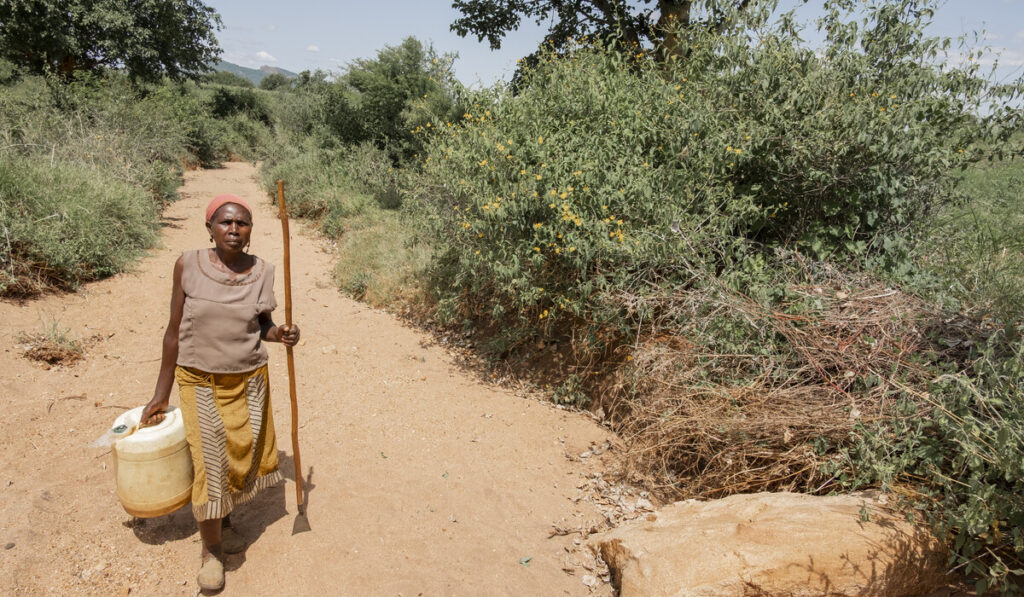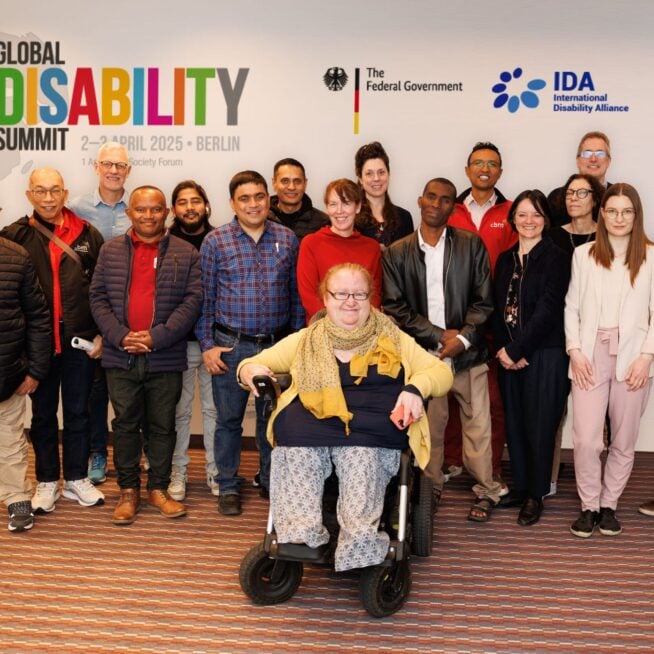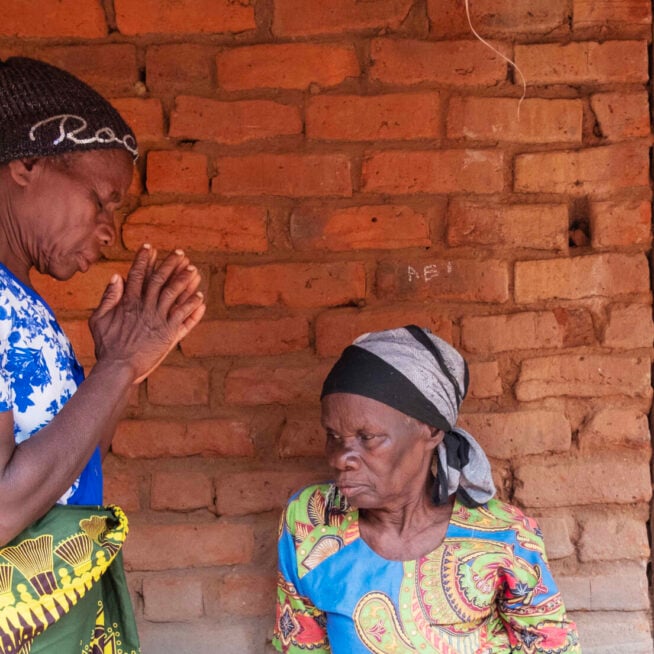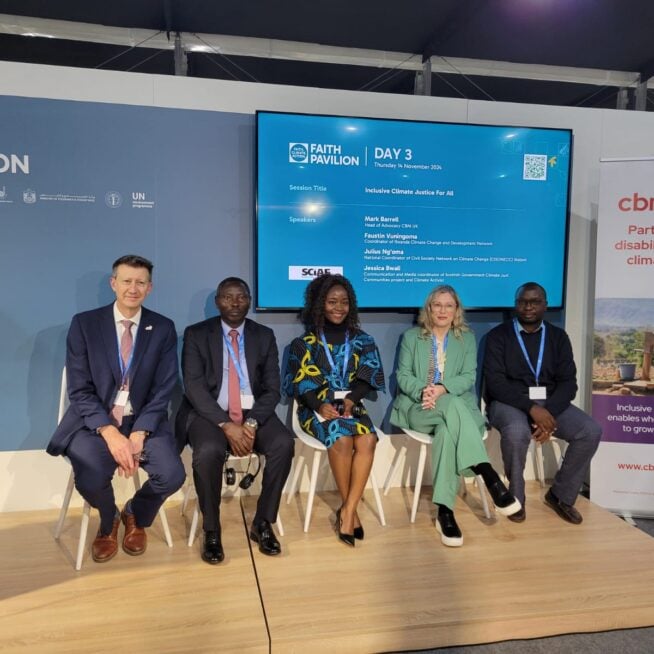Want to transform lives with us? Stay in touch and hear about our news, activities and appeals by email!
Is the climate crisis impacting upon global implementation of the Convention on the Rights of Persons with Disabilities?

CBM UK has published a new Discussion Paper investigating how the climate crisis is impacting upon global implementation of the Convention on the Rights of Persons with Disabilities (CRPD). The paper was launched at the United Nations Framework Convention for Climate Change (UNFCCC) annual Climate Conference in Bonn, in June 2023.
The Discussion Paper is based on a small study by a student team at the London School of Economics, as part of their MSC Health and International Development programme. With guidance from me and Mary Keogh (CBM Global’s Advocacy Director), they reviewed available budget data and literature, and conducted a series of key informant interviews with representatives of Organisations of Persons with Disabilities (OPDs) in three focus countries, Bangladesh, Kenya and Nepal. We are indebted to them for this work and very grateful to the key informants who generously gave their time.
Read CBM UK’s Climate Change and Disability Rights Discussion Paper here.
CRPD and climate change
The CRPD sets out expectations on governments to take measures – to the maximum of their available resources – to progressively achieve the full realisation of the rights of people with disabilities. As an internationally agreed human rights convention any potential negative impact on its implementation would add a further human rights dimension to the climate crisis and its response.
Have the CRPD compliance measures that governments have put in place helped them make disability inclusive climate decisions, or is the climate emergency overriding CRPD compliance and diverting government finance away from disability inclusion? We hypothesised that the costs and damages incurred by climate change, if not met with additional and specific funding, would result in national funds being diverted away from essential government services. Our concern, if so, is that services for people with disabilities would be disproportionately affected as they are so often financed through discretionary funding and more vulnerable to cuts in an economic downturn.
Reviewing the situation in three countries at the forefront of the climate crisis – Bangladesh, Kenya, Nepal – four common concerns arose:
1. Financial data evidencing countries’ CRPD-compliant budgeting is very limited, making it difficult to understand where money is being spent and potentially being re-allocated during times of crisis.
“These legislative issues are just ink on paper, in reality we are still seen as one of three vulnerable groups (women, youth, and persons with disabilities), what is worse is that they group us together when it comes to budgeting and empowerment programmes and – funds go to women and youth, we are often forgotten.” OPD Leader, Kenya
2. OPDs and people with disabilities are not systematically included or meaningfully consulted in budgetary decision-making for policies, even those that specifically relate to people with disabilities, both within and outside the context of climate change.
“…the persons with disabilities are invited, but their voices are not. Their choices are not reflected in the decision” OPD Leader, Nepal
3. With increasing costs to governments in tackling the climate crisis, disability is not a key priority in any area, including policy and finance allocation in each of our case study countries. Some concern was raised with respect to reallocation of budgets away from disability-related spend during the COVID crisis.
“We are always the first to lose, we were the first to lose our jobs, our access to education, and our access to health services, and access to the cash support when COVID-19 started.” OPD Leader, Kenya
“Last year, there was a huge flood in the Sylhet region… and more funding is required for that area to rebuild. So that means some fund cut will happen. And of course, disability is a more ignored issue and if something is cut, then it will cut from the disability” Disability Activist, Bangladesh
4. Structural gaps in communication and coordination between ministries make cross communication challenging between the departments working on the implementation of disability rights and departments working on climate adaptation and mitigation. This contradicts Article 33 of the CRPD (government coordination) and inhibits mainstreaming of disability inclusion in governments’ climate action.
OPD representatives recognise the climate crisis as an opportunity for raising their voices and receiving the attention from government that they have sought for a long time. They express hope that the urgency of this agenda will give them more exposure.
The impact of climate change on people with disabilities is not really in dispute – yet limited data inhibits the political imperative to respond appropriately and there remains little pressure on governments to consult people with disabilities in developing and funding their climate response.
Five priorities to help OPDs and Governments achieve their aims
OPDs need easier ways to trace and demand greater accountability for government climate responses. Governments need to realise their commitment and improve transparency around their CRPD-compliance, while also furthering climate actions that “do no harm” and protect the rights of people with disabilities.
We identify five priority areas to help both OPDs and Governments achieve their aims:
- Take action to empower OPDs for effective climate-related policy engagement, through targeted training and promotion of climate awareness.
- Prioritize disability data as a critical enabler for OPDs’ climate advocacy and to support stronger, more inclusive government decision-making.
- Make budget data available to all, accessible, and understandable and develop more inclusive and participatory budgeting and tracking systems.
- Take a rights-based, whole government approach to CRPD-compliant budgeting so that disability inclusion is not the sole responsibility of social welfare departments, but a collaboration across Ministries and all government policy priorities, programmes and budgets.
- Calculations and funding mechanisms (such as insurance schemes) for climate action, including loss and damage, must be non-discriminatory and inclusive of people with disabilities.
Our Commitment
CBM UK is committed to supporting the efforts of the global disability movement in centring the UN’s framework for disability rights alongside governments’ response to the climate crisis. Inclusive financing and budgetary processes are key to this alignment, and we will continue to ally with all those committed to correcting this under-researched, under-represented and under-financed dimension of the climate emergency.
“The CRPD clearly stipulated signatory States as duty bearers and also calls for non-discrimination, equality of opportunity and accessibility. …We are at a very critical stage to not pay attention to the voices of persons with disabilities in climate policy making and particularly in climate actions and planning”. Shitaye Astawes (African Disability Forum) speaking at the UNFCCC Climate Conference, Bonn, June 2023
Download Climate Change and Disability Rights Discussion Paper here (PDF)
Main image: Sofia stands in the dry riverbed near her home in Tharaka North, Kenya. She had been able to gather water from this river, but can not walk long distances to find water due to her disability. Copyright: CBM/Hayduk





